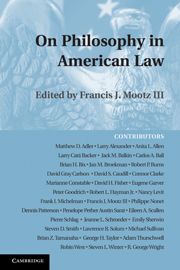Book contents
- Frontmatter
- Contents
- Introduction
- PART I KARL LLEWELLYN AND THE COURSE OF PHILOSOPHY IN AMERICAN LAW
- PART II PHILOSOPHICAL PERSPECTIVES ON LAW
- PART III AREAS OF PHILOSOPHY AND THEIR RELATIONSHIP TO LAW
- 12 On Philosophy in American Law: Analytical Legal Philosophy
- 13 Political Philosophy and Prosecutorial Power
- 14 On (Moral) Philosophy and American Legal Scholarship
- 15 The Aretaic Turn in American Philosophy of Law
- 16 On Continental Philosophy in American Jurisprudence
- 17 Psychoanalysis as the Jurisprudence of Freedom
- PART IV PHILOSOPHICAL EXAMINATIONS OF LEGAL ISSUES
- PART V LAW, RHETORIC, AND PRACTICE THEORY
- PART VI QUESTIONING THE RELATIONSHIP BETWEEN PHILOSOPHY AND AMERICAN LAW
- PART VII COMMENTARIES
- Contributors and Selected Bibliography
- Name Index
14 - On (Moral) Philosophy and American Legal Scholarship
Published online by Cambridge University Press: 31 July 2009
- Frontmatter
- Contents
- Introduction
- PART I KARL LLEWELLYN AND THE COURSE OF PHILOSOPHY IN AMERICAN LAW
- PART II PHILOSOPHICAL PERSPECTIVES ON LAW
- PART III AREAS OF PHILOSOPHY AND THEIR RELATIONSHIP TO LAW
- 12 On Philosophy in American Law: Analytical Legal Philosophy
- 13 Political Philosophy and Prosecutorial Power
- 14 On (Moral) Philosophy and American Legal Scholarship
- 15 The Aretaic Turn in American Philosophy of Law
- 16 On Continental Philosophy in American Jurisprudence
- 17 Psychoanalysis as the Jurisprudence of Freedom
- PART IV PHILOSOPHICAL EXAMINATIONS OF LEGAL ISSUES
- PART V LAW, RHETORIC, AND PRACTICE THEORY
- PART VI QUESTIONING THE RELATIONSHIP BETWEEN PHILOSOPHY AND AMERICAN LAW
- PART VII COMMENTARIES
- Contributors and Selected Bibliography
- Name Index
Summary
Why isn't contemporary moral philosophy more influential in contemporary U.S. legal scholarship? I am a legal scholar who tries to stay current with the academic literature on moral philosophy and to bring its insights to bear on legal issues. I have, for some time, been puzzled by the paucity of fellow travelers. A thought piece for a book on philosophy and American law seems to be an appropriate forum for me to ventilate a bit on the question. My focus here will be U.S. legal scholarship (and I'll henceforth generally drop the adjective U.S., which will be assumed in what follows).
I take it that many legal scholars have a general familiarity with moral philosophy, not just classical work (Bentham, Hobbes, Locke) but also famous modern work. They have read, or at least have heard of, the work of Robert Nozick, Derek Parfit, and John Rawls, and they aren't surprised by terms like consequentialism, veil of ignorance, difference principle, or side-constraint. But why aren't there more legal scholars who make it a point to remain well-versed in current developments in moral philosophy? Academic moral philosophers, housed in university philosophy departments, continue to work in the philosophical traditions to which Nozick, Parfit, and Rawls so notably contributed. Why do so few legal scholars try to stay abreast of that work?
- Type
- Chapter
- Information
- On Philosophy in American Law , pp. 114 - 121Publisher: Cambridge University PressPrint publication year: 2009

